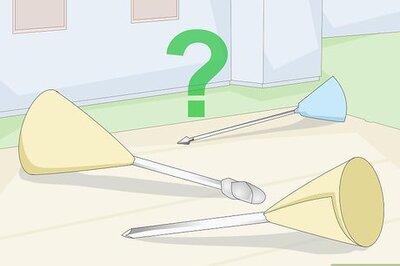
views
Remember to make yourself a priority.

Focus on your own well-being, not just his. It takes two to tango, but it’s hard for you to get onto the dance floor when you’re only ever worried about him, or even about the relationship. Don’t hesitate to take some alone time, go out with your friends, or meet new people outside of the relationship. A rich personal life enhances a relationship, while a personal life that consists only of the relationship tends to go stale. Also, don’t be afraid to set privacy boundaries with him. Everyone needs a private space, whether that’s your phone, a room set aside just for you, or even a few hours a week to do something by yourself.
Live your own life.

Make time to pursue your own goals and interests. Your relationship is a big part of your life, but it’s not the only part. If you pour all your attention into maintaining it rather than, say, also getting an education or honing other skills, you may find yourself entirely dependent on the relationship, which spells bad news if (heaven forbid) the relationship ends. Make it clear from the outset that you won’t ignore your ambitions for the sake of the relationship. Or, tell your partner that you want to broaden your own horizons by taking classes or joining a social club. A supportive partner will be all for it.
Appreciate your differences.

Think of his differences as something to celebrate, not change. When you dive into a relationship, it’s tempting to want the other person to be like you—to want the same things, act the same way, or even show love the same way you do. That’s not only unrealistic, it’s a recipe for disaster. Thinking that way, he’ll only fall short of your expectations. Let him be his own person, and ask that he do the same for you. If he was the same person as you, that probably wouldn’t be a very exciting relationship, would it? If you’re having trouble accepting some of his quirks, ask yourself, “Do his differences hurt anyone? Do I not like them just because they’re not what I expected? Would he be the man I love if he didn’t have those quirks?”
Don’t change for his sake.

Be yourself to maintain a comfortable relationship. It sounds obvious, at least until you find yourself holding yourself back, biting your tongue, or acting or even dressing differently in the hopes he’ll like you more. But it’s awfully uncomfortable trying to fit into a round hole when you’re a square peg. The best thing you can do, for yourself and your relationship, is stay true to who you are—as goofy, sloppy, and flawed as you might be—and trusting that he’ll accept and love you for it. The right man will. Part of being yourself is also accepting a little change when you do enter a relationship. As people, we don’t exist in a vacuum, and we do shift a bit when interacting with other people. The key is accepting the changes that feel natural, and interrogating the changes that don’t.
Take some risks.

Put yourself out there when dating, and when settling down. Finding the right guy requires some amount of risk, which is a hard truth. You have to be vulnerable, trust the process, and chance a broken heart. Don’t hesitate to talk about your personal life, if you feel comfortable doing so, and take a chance on a guy who seems like he may not be your type now and then—you never know who might surprise you. If you’re still trying to meet the one, try a date that gets you out of your comfort zone (but doesn’t challenge your safety). Try something you’ve never done before, like taking an art class together. Even if you’re not very good at it, you’ll encounter your date in a much more vulnerable way than a simple dinner would allow.
Discuss your future.

Let your partner know your long-term goals to avoid surprises. Before you get too comfy with a guy, ask some hard-hitting questions: Does he want kids? What are his finances like? Does he want to get married someday? Knowing these things early on helps you get on the same page and sidestep misplaced expectations, saving you plenty of trouble down the line, when things get more serious. Also ask him: What do you think are qualities in a good parent? How often do you like to have sex? Do you see yourself still in a relationship in 10 years?
Don’t rush it.

Take your time and enjoy the moment in your relationship. The first date was everything you hoped, so marriage is just around the corner, right? Maybe not. Hurrying your relationship along is a good way to find yourself waking up next to the wrong person. We know, life is short, and you want to spend as much of it with the right person as possible, but you have to find that person first, and the way to do that is by taking it slow, learning about your partner, and letting things unfold naturally. You might be asking: When’s the right time to say, “I love you?” When should you get him to move in? How long should you date before one of you pops the big question? The only right answer is: Whenever it feels right! That might be months or years, but if you enjoy each other’s company, what’s the rush?
Rise above gender roles and expectations.

Don’t settle for being the archetypal girlfriend or wife. It’s an ugly truth that some men out there are looking for nothing more than a homemaker. And even men who’ve gotten past that thinking sometimes accidentally expect you to play a certain role at home, which researchers have identified as a real problem in many relationships. Divvy up chores based on who’s available when, not based on gender. If he’s got free time in the evening, ask him to cook. If you’ve got home-repair know-how, roll up those sleeves and fix that toilet. Chores need doing, regardless of gender.
Say what’s on your mind.

Let him know how you feel and what you want. He’s not a mind reader, and he can’t cater to your every need as soon as you need it (much as we wish he could). Strive to communicate better in your relationship: say what you mean, and say it often. Don’t just drop hints and hope that he picks them up. He’ll appreciate the clear communication, and you’ll appreciate the ability to be open and honest with him. Also, ask him what’s on his mind! It’s easy to get lost in your own head, and sometimes we need our partners to pull us out of them. A simple, “What are you thinking?” or, “How can I make your life easier today?” lets him know that he can trust and depend on you.
Be friends first, romantic partners second.

Strive to be more than just a partner to your partner. We don’t necessarily mean you should date your friends. Really, we’re just saying that the Venn diagram of your romantic partner and your best friend should, ideally, overlap quite a bit. In fact, research shows that this “two-in-one” relationship might be the key to long-term romantic success. To help make your partner your friend, do some casual, platonic things with them that you usually do with your other friends. Go shopping, run some errands, or fill them in on the latest gossip. The important thing is feeling totally comfortable around them. Ask yourself: Do you want to be around your partner more often than not? Are they the first person you want to tell when something exciting or even terrible happens? Are there things you’d tell your best friend but not your current partner? Why?
Share your friends.

Introduce him to your social circle, and meet his, too. True, you both lead your own lives, but that doesn’t mean they can’t overlap. Bringing him along to spend time with your family or friends lets him see another side of you, and you get to see another side of him when you meet his social circle. And if you’ve got another couple you can go on double dates with, all the better. Research shows that couples who chat with other couples from time to time end up strengthening their own relationship. Don’t hesitate to invite him to that party, or bring him as your plus-one to that wedding. When you move about the world as a couple, you get more comfortable thinking of yourselves as a unit, not just 2 people who are dating.
Curb your jealousy.

Focus on what you have, not on what you stand to lose. Romantic jealousy is real—that feeling that you might lose him to someone else, or that another girl is trying to take him. But consider these 2 possible outcomes of that sort of situation: Either A) he gives in to the other woman, proving he wasn’t right for you and saving you some time down the road, or B) he proves that he’s trustworthy and there’s nothing to worry about. From our perspective, you win either way. Also, when you lash out because of jealousy, it only serves to weaken your relationship. It can be hard to quiet those sneaky little voices, but it’s best to trust that he loves you and will choose you every time. Reduce feelings of jealousy by refocusing your attention on what you like about your partner. And if the feeling gets overwhelming, don’t hesitate to let him know that you’re struggling. Say, “I know you love me, but I’ve been feeling a bit insecure in our relationship.” Even just getting your feelings out there helps to dispel them.
Expect a few bumps in the road.

Accept that your relationship will have rough patches. A wise person once said, “Happiness isn’t the goal; it’s the result.” Which is to say that you don’t build a happy relationship overnight, and expecting smooth sailing every day isn’t realistic—it’s also not the point. The best relationships are ones where you give each other permission to have bad days. And when you know you can work through the bad days, the good days are much more frequent. If you’re in a rough patch, give him some space for a while so that the both of you can collect your thoughts. Spend some more time with friends, or text him less often, but let him know that you’re there when the time comes to get close again.
Shrug off the small disagreements.

Let the little things go, when you can. Everyone gets flustered now and then, and sometimes in a disagreement he might say something snarky off-hand, but that doesn’t spell doom for the relationship. “Accommodation” is the idea that in order to live and get along with someone, you have to learn to accept that sometimes you’ll act up or butt heads. It’s not pretty, but it’s normal, and sometimes the healthiest thing to do is shrug it off. If your partner says or does something that really does hurt you, that’s not something to just let go. Bring it up later when tempers have cooled, saying something like, “I know we were both heated, but I was hurt when you said that.” Explain your feelings; if he’s a good partner, he’ll take steps to avoid hurting you like that in the future.
Remember that you’re a team.

Aim to solve the issues, don’t try to “solve” each other. When solving relationship problems, keep in mind that it’s the both of you versus the problem, not you versus your partner. Avoid name-calling or petty assignments of blame. The only way out of a bind in a long-term relationship is through it, and you have to get through it together or not at all. When you’re talking through your problems, use “We” statements to emphasize that you’re a team. For example, say things like, “I want us to solve this. How can we figure this out?” instead of things like, “You need to be better.”
Go to bed angry, if you have to.

Give your problems time to air out. “Never go to bed angry” is another bit of timeless relationship advice. But what happens when you’re tired and frustrated and a good-night’s sleep is trapped on the other side of an argument? Nothing good, if you ask us. Keep to your bedtime, get some sleep, and see how you feel about things in the morning, when you have a fresh face and a fresh perspective. If you find yourself in an argument late at night, say something like, “I want to solve this, and I appreciate that you do, too, but I need some sleep. Can we pick this back up in the morning?”
Apologize using plain and earnest language.

Own up to your mistakes when you make them. Yes, it’ll happen to you. You say something thoughtless or unkind, or you forget an important date. Whatever it is, it’s not the end of the world, but you need to let your partner know that you understand what you did and that you’ll do your best not to do it again. When you and your partner can own up to your wrongs, you’ll both feel more comfortable and trusting. When apologizing, acknowledge your partner’s feelings, explain why you did what you did, explain how you’ll avoid it in the future, then end with a simple and sincere, “I’m sorry.” For example: “I hate that I made you feel forgotten when I missed our date. I wasn’t feeling well and got distracted when I went to call you. I’ll be sure to let you know when something comes up in the future, and I want to take you on another date soon to make up for it. I’m sorry.”
Compromise by making decisions where you both win.

Meet him halfway on the hard issues to make you both happy. Contrary to popular belief, compromising with your partner doesn’t mean giving something up for something worse. It means you both get to have your way, even if that looks a bit different than originally planned. When the two of you butt heads or don’t see eye-to-eye, strive to agree to disagree, then move forward with a solution that helps both you, strengthening your relationship in the long run. For example, if you can’t decide on a restaurant, you might have to give up your first choice, sure, but try to find a second-choice restaurant you both enjoy, or agree to visit one restaurant that night, and the other restaurant another night.
Avoid “keeping score.”

Act in your relationship, don’t just react. “Keeping score” is a pattern of thinking in which you only do something if another person has already done it for you—or, you won’t do something for that person because they didn’t do it for you. But keeping score like this, especially in a relationship, is a surefire way to build grudges and resentments, and to conceptualize your relationship as just a transaction. Instead, try to understand that your partner probably isn’t aware of the give-and-take to that degree. Communicate your needs and do for him what you’d want him to do for you, then trust that he’ll follow through.
Show your gratitude often.

Mind your manners, no matter how close you get with him. No, we’re not saying you have to be deferential with your man (bleh). Just that politeness goes a long way in maintaining a healthy and enjoyable relationship. If you need something, say, “Please.” If he does the dishes or makes the bed, a quick, “Thank you” and a kiss on the cheek shows him you appreciate his efforts. Simple acknowledgements like these make the both of you easier to live with. Ideally, he minds his manners, too. But if not, take the lead and set the precedent. Make it a point to be courteous, and he’ll most likely follow suit.
Break your routine once in a while.

Try new things with your partner to keep the relationship interesting. With any relationship comes some degree of routine. Some people thrive on routine. Others tend to feel like they’re a rat trapped in a mundane maze. If you’re feeling trapped in the day-to-day of romance, tell your partner you want to shake things up. Ask them if there’s something they’ve always wanted to do—something they want to learn, or an experience they’ve always wanted to have. Then take steps to make that a reality. Or, go to a new restaurant, take a trip, or even start a tricky, profound conversation. Pushing against those relationship fences is how you grow.
Don’t ignore the red flags.

When he shows you who he is, believe him. Actions speak louder than words, they say, and the same is true in a relationship. When he does something counter to what he says, believe his actions. But sometimes, words speak plenty loud, too. If he says something eyebrow-raising or off-color, take him at his word. That’s the key to spotting the red flags early—making sure he’s consistent in both what he says and what he does. If you do spot a red flag—anything from harsh words to excessive drinking or what-have-you— address them early. Letting them slide only allows the problem to continue. When you do address them, use “I” statements and clear language. Say something like, “I’ve been worried about what you said earlier, and I want to come back to it. Can you explain what you meant?”
Never settle, but always build.

Don’t stay with the wrong guy; know when to grow with the right one. You’ve probably heard that you should never settle—period, end of discussion. But that mindset is the quickest way to letting someone who’s genuinely good for you slip by in pursuit of someone who doesn’t exist. Sticking with a flawed partner who wants to help you grow, and who you want to help in return, however, is a recipe for lifelong success. Instead of settling, make a list of what you want for yourself out of life, and ask yourself if your potential or current partner can or is helping you realize that. That way, you turn your expectations inward instead of applying unfair expectations outward.
Never tolerate abuse of any kind.

Find help if you ever feel unsafe in your relationship. Abuse comes in many forms: sexual, verbal, even physical. But no matter the form, you should never stick around when it rears its head. Learn to recognize the signs of abuse, like physical or sexual assault, repeated insults, or emotional manipulation, and remove yourself from the relationship if they apply to yours. Tell a trusted friend or family member as soon as you can, and ask if you can stay with them while making moves to end the relationship. Also consider seeing a therapist or counselor to help you process your thoughts and emotions. Or, contact the National Domestic Violence Hotline if you ever feel unsafe.
Let him go if the time comes.
Don’t stay in an unhappy relationship. Everyone wants “the one,” and everyone hopes that their current partner is that person. But we’re all just trying to figure out this thing called romance, and sometimes it takes a couple tries to get it right. If you wake up one day and realize you’re unhappy, the relationship just isn’t working, or you want to break up for any reason, know that it’s okay to walk away. Lying to yourself is a disservice to the both of you. Your time will come, and now you’ve got some good practice under your belt for when “the one” does arrive.




















Comments
0 comment